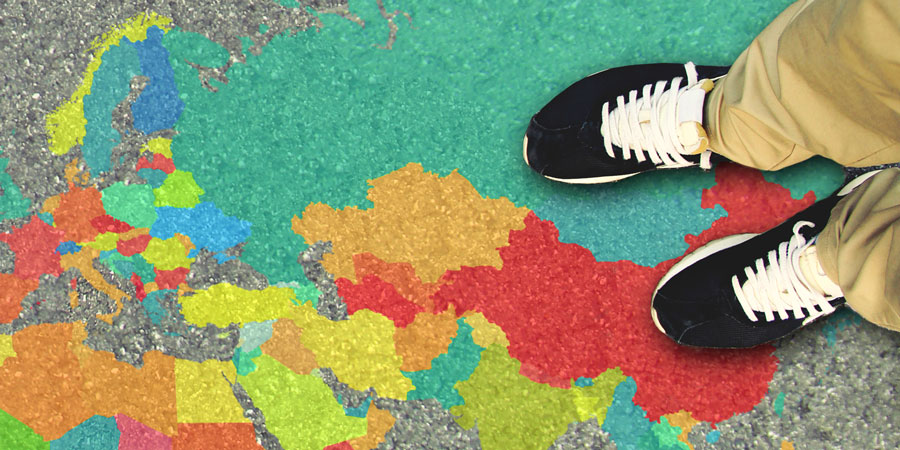
Valuing our Cultural Wealth
BHCC engages College community in equity work.
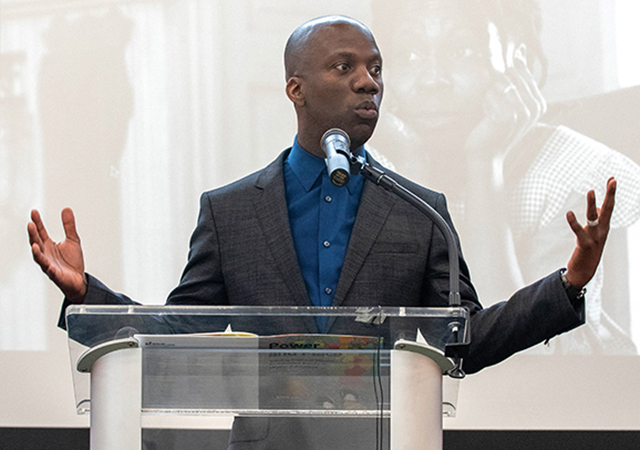
Until we do right by our students of color, everything we think about equity will fail,”boomed Shaun Harper, Ph.D., nationally recognized scholar on race and equity and founder and executive director of the University of Southern California Race and Equity Center, as he delivered the keynote address at BHCC’s Second Annual Center for Equity and Cultural Wealth Institute. “Cultural competence,” he continued, “is not going to cut it. We need colleagues who are highly skilled. Mere competence is only going to further exacerbate the inequities we currently see.... Until we get more strategic and intentional about our equity work, we are going nowhere fast.Shaun Harper, Ph.D.
On May 28-30, over 240 faculty, staff, administrators, artists, cultural institutions and community partners came together during the 2019 Annual Center for Equity and Cultural Wealth (CECW) Institute to develop their knowledge base and skills related to the Institute theme, “Power and Place: Valuing Cultural Wealth to Advance Equity in Higher Education.” Developed by a team of faculty, staff and administrators from across the College, the CECW Institute is part of a multifaceted student success agenda to meet the needs of the College’s diverse student population and ensure all students are able to achieve excellence. Evans Erilus, the 2019 Institute co-chair, and Educational Case Manager in the BHCC Welcome Back Center, described the Institute as “an encouraging step towards putting equity and cultural wealth on center stage, and affording all in attendance an opportunity to engage in activities and critical discussions that will impact their work.”
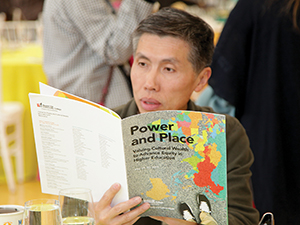
-Emmanuela Maurice, Professor, English Department
The 2019 Institute enabled participants to engage with colleagues across sectors in a series of critical questions, including: Why is a focus on equity and cultural wealth critical to student success? How are local organizations and institutions working to recognize and amplify community cultural wealth and/or disrupt inequities? How can we collaborate across sectors to reimagine higher education?
To answer these questions, the Institute agenda was structured in three parts:
Day 1
Explore foundational theories and high-impact practices
Day 2
Experience place-based teaching, learning and student development
Day 3
Reflect on the design, implementation and assessment of inclusive and equitable curricula and programming
-Peter Kiang, Ed.D.
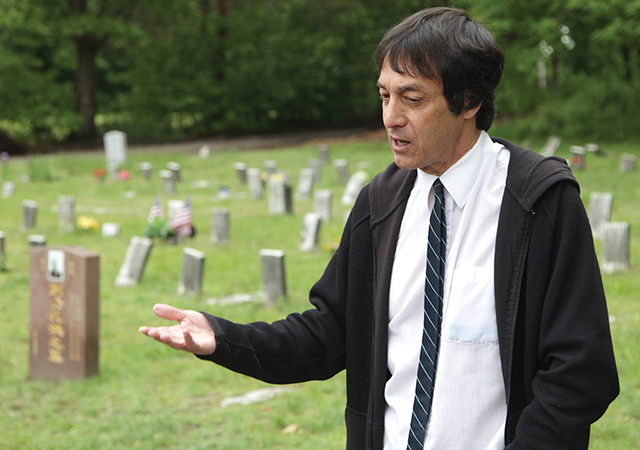
Bilingual poet Rhina P. Espaillat, BHCC’s 2019-2020 Artist in Residence, opened the Institute with a poem about her experiences as a student encountering a Western curriculum shortly after immigrating from the Dominican Republic to Manhattan in 1939. During the keynote address, Shaun R. Harper, Ph.D., provided national context on the relationships between race, equity, campus climate and student success, and resources for critical reflection and strategic planning toward achieving equity outcomes.
BHCC Professor Emmanuela Maurice noted the important and challenging work involved in addressing issues of social and racial justice in higher education, “Integrating issues of social justice into coursework isn't easy. But as Dr. Harper stated, we have to become comfortable with being uncomfortable when discussing racism. The Institute has provided me with resources and courage to continue this work in the classroom.”
Day 1 continued with interactive workshops facilitated by BHCC faculty, staff and administrators as well as local artists, museum educators and community organizers, with wide-ranging topics that included the experiences of Asian American Pacific Islander students with internalized and external racism, supporting the success of Latinx students enrolled in STEM programs at BHCC and UMass Boston, dismantling Colonial narratives about native populations in the curriculum, and the impact of gentrification on English language learners in East Boston.
Institute participants noted in their program evaluations that workshops were critical in deepening their understanding of equity and cultural wealth, and honing their ability to integrate high-impact practices into their work.
Day 2 of the Institute connected participants with the cultural wealth of greater Boston’s neighborhoods, organizations and institutions through field study. Peter Kiang, Ed.D., Professor and Director of the Asian American Studies Program in the School for Global Inclusion and Social Development at UMASS Boston, began the day with a keynote address focused on the place-based learning experiences of UMASS Boston students in the Chinese Burial Grounds of Boston’s Mount Hope Cemetery. When reflecting on the power of place-based learning, Kiang said, “Previous generations of students are still engaged with the curriculum after they leave. Why? The places we go and the lessons they learn stay with them… In those places and classroom spaces, I won't call them sacred.
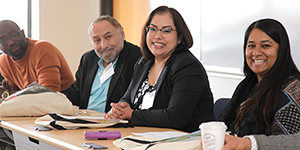
But spiritual, powerful and important to learning? Yes, they are.” Following the keynote, participants had the opportunity to experience place-based learning first-hand: they were assigned to one of 11 field study sites that included the Chinese Burial Grounds, Islamic Society of Boston Cultural Center in Roxbury and Latin Quarter in Jamaica Plain. Field study challenged participants to re-imagine neighborhoods, organizations and community development through the lens of education, power and equity. After a tour of Boston’s historic Chinatown neighborhood, Assistant Professor of Mathematics Isaias Sarmiento noted, “I shop in Chinatown all the time, but this time I got to see the history. Now when I go to Chinatown, I see it differently; I reflect more and think about things I learned on the guided tour.”
Additional walking tours focused on Boston’s LGBTQ history and Chelsea’s community-based response to gentrification. One field study group explored Deer Island and discussed the erasure of indigenous communities from historical accounts of Colonial southern New England, while a trip to Mt. Auburn Cemetery and Boston monuments traced the lives of powerful black women Harriet Jacobs, Phillis Wheatley and Harriet Tubman.
-Yolanda Sealy-Ruiz, Ph.D.
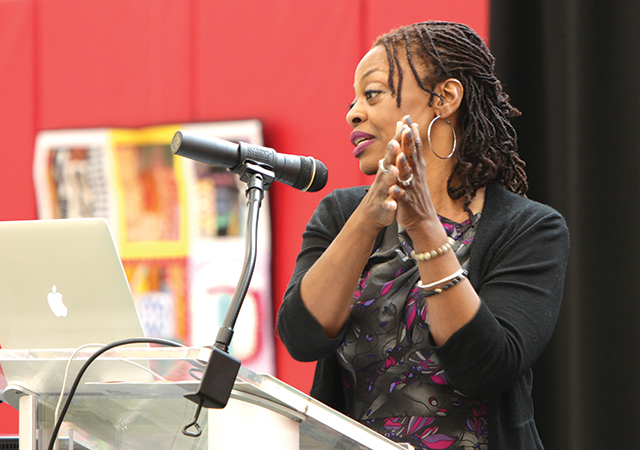
Day 3 allowed participants to apply what they learned on the first two days of the Institute to the design of teaching, learning and workspaces that consider power and place. The morning began with the announcement of the College’s 2019-2020 One Book selection, If They Come for Us, poems by Fatimah Asghar. The One Book Program engages the College community in a dialogue about a common text that addresses contemporary issues. Ashgar’s poetry builds on the theme of the CECW Institute and captures the experiences of being a young Pakistani Muslim woman in America. Yolanda Sealy-Ruiz, Ph.D., Associate Professor of English at Teachers College Columbia University and founder of the Racial Literacy RoundTable Series, kicked off Day 3 with a keynote address that distinguished between “allies” and “co-conspirators” in meeting the demands of justice. Ruiz challenged the audience to be co-conspirators in the fight for student success by developing racial literacy, and to move critical conversations about race from the margins to the center of the College community. “Racial literacy includes the ability to read, discuss and write about situations that include racial inequity and racial bias as part of the norm,” she said.
Workshops on the third day allowed faculty and staff to share successful models in a Power and Place Teaching, Learning, and Student Development Showcase, which highlighted the CECW curricular and co-curricular integration at BHCC. Faculty and staff from across the College shared assignments, syllabi, classroom activities, student development programming and leadership development models with colleagues to provide examples of how core concepts of equity and cultural wealth can be woven into the fabric of the student, faculty and professional staff experience at BHCC.
The Second Annual Institute honored the CECW’s commitment to engage the College’s community in culturally relevant scholarship and practice focused on achieving equitable outcomes for all students. Dean of Behavioral, Social Sciences and Global Learning Liya Escalera remarked, “Institute participation in our second year demonstrates that BHCC employees and our community partners are eager to continue this important conversation. We cannot serve students and create a learning environment that will support their success without intentional and continuous opportunities to come together, learn from each other and collaborate towards greater equity on and off campus.”
Follow-up activities include opportunities for faculty and staff to engage in curricular and co-curricular integration projects that will feature ideas, themes and content from the Institute and will be piloted during the 2019–2020 academic year.
Rooted in BHCC’s eight-year history of sponsoring cultural institutes, the CECW draws on the College’s nationally recognized model to design culturally inclusive learning environments that value the strengths of our diverse students, faculty, staff and local communities. Dean Michelle Bloomer noted the importance of meaningful professional development in supporting equity in the BHCC community. “The Center for Equity and Cultural Wealth Institute not only affords us a crucial opportunity for professional development that can enable faculty, staff and administrators to expand their understanding of the College’s equity mission and integration of culturally inclusive practices,” said Bloomer, “but also creates the space to reflect and evaluate our progress towards our commitment to equity and our role in its advancement.”
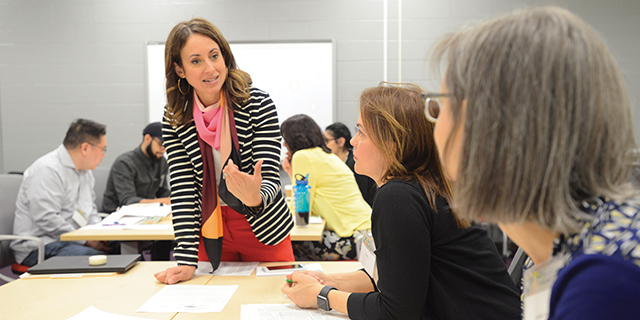
Institute participants engage in discussion about enacting high-impact practices that value students' cultural wealth.

A Commitment to Equity on Campus
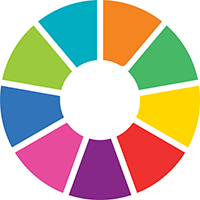
Charged with developing an equity-minded culture at the College, BHCC’s Equity Work Group (EWG) formed in the spring of 2018. The EWG has been organizing under two goals: (1) assessing the culture and climate of the College so that equity informs interactions between staff, faculty and administrators and (2) reimagining the role of Chief Equity, Diversity and Inclusion Officer (CEDIO) at the College.
Over the course of the academic year, the EWG partnered with BHCC’s Office of Institutional Effectiveness and the CECW to identify an appropriate survey instrument to assess culture and climate at the College. The survey will be disseminated to the College community during the fall semester.

